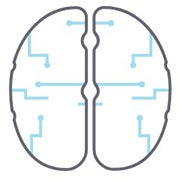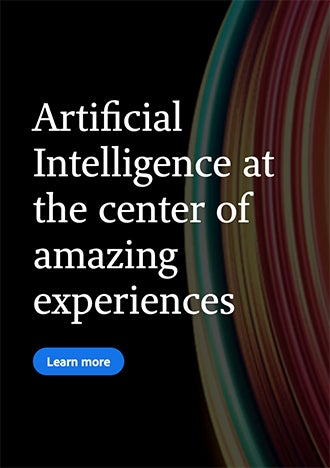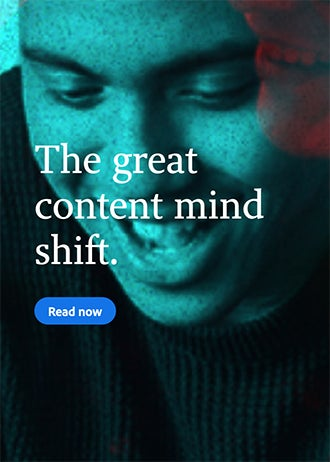Amplifying Human Creativity with Artificial Intelligence

“Machine learning is going to change every single aspect of technology, but no machine will be able to mimic the creative ability of the human mind.”
Shantanu Narayen
CEO, Adobe
If you’ve ever had to create 16 different color swatches of an item for a website, compare 2 lengthy documents to ensure changes are consistent, or sift through mounds of website traffic stats to discover why your sales took a dive, you know that these kinds of tasks can be tedious and time-consuming rather than creative or strategic. Imagine, however, saying goodbye to the boring parts of your job and instead using that time to work on an innovative concept or to develop a marketing strategy for a new product launch.
For us, this is the allure of artificial intelligence – the ability to gain an intelligent creative or marketing “assistant” that can take on these less creative tasks, thereby freeing you to focus on being truly strategic in your work. This isn’t something you should fear – you should embrace it. Even at its most powerful, AI doesn’t replace human intelligence, it simply helps people do what they love better and faster while opening the door to new and exciting ways to experiment, test, and learn from customers to create dramatically improved experiences.
“Good AI makes life easier. Great AI gets out of the way.”
Sid Shah
Senior Director, Customer and Product Analytics, Adobe
AI sets the digital standard
Artificial intelligence already touches some form of your life every day. From smarter web searches to e-commerce recommendations to voice assistants – AI is integrated into how you live, work, and communicate in the world. It’s the standard by which you evaluate your digital interactions with brands – expecting that every touchpoint will be as easy and intelligent as ordering paper towels from Alexa or finding what you were searching for on Google in your top three search results.
With deep expertise in creativity, marketing, and digital documents, Adobe is already using AI, machine learning, and deep learning to make creating and delivering digital experiences easier, faster, and better. Keep reading to find out how.
Making sense of AI and machine learning
Artificial intelligence, machine learning, and deep learning – what does it all mean and how do they work? Here’s a quick overview:

Artificial intelligence (AI) is the field of computer science that studies how to make computers good at new types of tasks – particularly tasks that until recently could only be done by human beings.

Machine learning (ML) is a subfield of AI devoted to creating programs that improve their performance when you give them more data, rather than requiring the improved performance to be programmed in by hand.

Deep learning is a set of ML techniques that are loosely modeled on how neurons in the brain communicate with each other and adapt to new data.
These technologies allow machines to perform tasks in seconds that can take humans hours.
“We are using AI to deliver the art of creativity and the science of data.”
Tatiana Mejia
Group Product Marketing Manager, Adobe Sensei, Adobe
Master the digital experience with Adobe Sensei
Adobe Sensei is the technology that powers intelligent features across all Adobe products. Whether you’re a creative, marketing, or business professional, Adobe Sensei can help you work more productively, create the right content faster, and deliver that content to the right customer across the right channels – all at the right time.
As Adobe continues to develop its AI, machine learning, and deep learning offerings within Adobe Sensei, the focus is on three core competencies – content understanding, computational creativity, and experience intelligence – that help our customers deliver more highly personalized digital experiences faster.
Setting the bar for AI innovation
At Adobe, we focus intently on improving the creative and business processes of our customers. Therefore, all Adobe Sensei features must be able help our customers do one of these three things:

Discover what is hidden. When information is hard to find because there’s too much of it to sort through or it takes too long to extract it, Adobe Sensei can help.

Accelerate what is slow. When repetitive, time-consuming processes are handled for you, you have more time to be creative and productive.

Decide what matters. When trends, anomalies, or significant events are brought to your attention and you can get data-driven recommendations on what works or ways to optimize, you can better prioritize decision-making.
1. Content intelligence — get help reading between the pixels.
Adobe Sensei is trained to deeply understand the language of digital content such as images, videos, animations, and illustrations. This helps you build better digital experiences faster and increase personalization.
For instance, there are over 100 million assets in Adobe Stock. This can make finding the right image a daunting, time-intensive task. However, through a combination of artificial intelligence and deep learning, Adobe Sensei can understand not only what objects are in the image, but also deeper concepts like the aesthetic quality, composition, color palette, and even emotional concepts behind the image, such as a query like “family on a beach at sunset with waves in the background.” Then, using this depth of understanding, the technology can rapidly search the entire Adobe Stock image library to find the images that most closely match your needs, helping you to find the perfect image for your marketing campaign or website design in seconds rather than hours.
Other ways Adobe Sensei understands content includes the following:
• Identifying and tagging images. Uses machine learning and deep learning to automatically tag images with key words as well as higher level concepts, Adobe Sensei saves photographers the drudgery of tagging thousands of photos while helping marketers and designers quickly tag and organize assets for better ROI.
• Selecting subjects from images. Understands images from a background, even fine details like hair, reducing the laborious masking process to a click and a few seconds.
• Summarizing text. Understands the meaning of large chunks of content and can automatically summarize the content down to the number of words you select, such as taking a 500-word piece and creating a 100-word executive summary.
• Analyzing the semantic structure of documents. Identifies features such as paragraphs, tables, or headings from visual features in either scanned or plain documents.
Graphic designer Jesús Ramirez, who was recently highlighted on Adobe’s blog, notes the ability to go to Adobe Stock and have the computer understand and find what he needs quickly is huge. “I needed hands in a specific position,” he says, “so I took photos of my own hands mimicking those positions and used them to search. In the past, I would have had to type in ‘hand,’ but how do you describe hands doing a certain thing? And even if you could, what are the odds that the creator used those same keywords? For things like that, AI is great.”
“We’ve shown that an agent can silently be making recommendations, seeing what you are doing and bringing up related content. Understand when you are doing a repetitive task and do those on your behalf.”
Scott Prevost
VP Engineering, Adobe Sensei and Search, Adobe
2. Creative intelligence — create more amazing experiences with less effort.
Even the best creative ideas take considerable time and effort to go from a concept to a finished digital asset. By adding AI-powered computational creativity to the digital tools artists use, AI can accelerate the design process, eliminating many of the steps in the creation process that require a lot of mouse clicking rather than deeply creative work.
Adobe Sensei can automate time-consuming content creation tasks like the following:
• More realistic 3D designs. Use AI to set background lighting and correct perspective to match the foreground image.
• Animating characters effortlessly. Create characters and bring them to life by acting out your movements and recording your voice using your webcam and microphone while your facial expressions and motions are tracked in real time. And, combined with a new lip-sync algorithm powered by Adobe Sensei, you get more accurate mouth shapes to correspond with spoken sounds.
• Remixing music automatically. Analyzes song files, identifying hundreds of loops, transitions, and important segments and then allows you to quickly rearrange any song to fit any duration.
• Making your photos look more professional. Uses AI to analyze your photo and compare it to thousands of professionally edited images in our database and then uses this information to recommend the ideal edits to exposure, contrast, and other settings to make your own photo better.
As Adobe CTO Abhay Parasnis noted to TechCrunch, “When one of the very best artists in Photoshop spends hours in creation, what are the other things they do, and maybe more importantly, what are the things they don’t do? We are trying to harness that and marry that with the latest advances in deep learning so that the algorithms can actually become partners for that creative professional.”
3. Experience intelligence – gain deeper insights and make better decisions.
In a world inundated with content and data, being able to quickly sift through the data, decipher the meaning, and make smart decisions is not just hard – sometimes it’s impossible for the human mind to do. Adobe Sensei’s experience intelligence can quickly analyze data to identify both patterns and anomalies. Then, it can use this information to make decisions about what content to deliver, when to deliver it, and to whom, so that the digital experiences you create are personalized and optimized to achieve the greatest return on investment.
To harness the experience intelligence of AI, you can use Adobe Sensei for the following:
• Personalizing content based on customer profiles. Finds the right content for each audience, such as displaying outdoor gear based on the geographical location and season.
• Optimizing ad spend. Helps you decide how much budget you want to allocate to each channel to ensure the best performance.
• Scaling to new audiences. Helps you identify new high-value audiences that aren’t intuitive based on current audiences.
• Optimizing for what works. Provides a virtual analyst who can sift through large quantities of data and alert marketers to statistically significant events, such as a spike in sales.
“In my mind,” says Lars Trieloff, principal at Adobe, “the highest value you can get out of AI is when it is making decisions in situations where there’s a lot of data or where you have to make very hard tradeoffs.” Whether trying to decide where to put your ad spend or determining which piece of content you should display in real-time to your customers, AI-powered tools make these decisions not only easier, but faster and more informed.
“By having really talented customers who are world class at content creation, we can pick up best practices and make them more widely available through the next generation of tools on our common framework.”
Gavin Miller
Fellow and Head of Research, Adobe
Speed innovation
Adobe Sensei is delivered in dozens of features across all Adobe products, including Adobe Creative Cloud, Adobe Document Cloud, and Adobe Experience Cloud. Access to the underlying Adobe Sensei services and the Adobe Sensei framework as part of Adobe Experience Platform is also available. This allows us to rapidly execute new artificial intelligence and machine learning breakthroughs across our entire company that save time, foster better decision-making, or improve personalization. And, because we have a shared platform with shared services, it also allows our partners to accelerate their own innovation by building custom solutions on top of our framework.
For example, with Adobe Sensei content intelligence services, you can quickly auto tag and search images of cars. However, if you are an auto manufacturer and want to further refine these auto tag capabilities to be more specific, such as being able to tag and identify cars that are a specific brand, make, or model, you can tap into the extensible framework to build your own custom AI model.
Additionally, a common framework helps support digital experiences all the way from creation to delivery to analysis. With a single tech stack and information flow, the entire customer experience journey can go smoother, faster, and better – from finding the right assets and making edits to targeting your audience and bringing back those insights to the creation process. The experience is seamless for you and for your customers and optimizes the content you deliver for the best performance.
“Given our heritage as a creative company, we have an almost magical, Harry Potter view of the world, where intelligence will get infused in everyday objects and small things, making our everyday lives magical and delightful in ways we simply can’t think of today.”
Abhay Parasnis
CTO, Adobe
Embrace the magic of AI
With AI advancing 10 times faster and at 300 times the scale of the Industrial Revolution according to McKinsey, many worry about the long-term implications. Some even argue that AI-powered machines will take over the world, destroy jobs, and pose a fundamental threat to our existence.
At Adobe, we see things differently. Our fundamental belief is that AI done right, in a manner that serves the creator of the experience and respects the consumer of the experience, will amplify human creativity and intelligence while opening up an exciting world of new possibilities for human creativity and productivity. For example, imagine having a creative assistant who learns from the way designers work to recommend edits and layouts based on an understanding of your personal style. Or, imagine as a marketer having the ability to create highly personalized cross-channel campaigns at scale that deliver offers based on knowledge of the purchaser’s style preferences, communication habits, and when they want to receive offers. Even business managers can do more with the ability to unlock the meaning and sentiment of documents and an intelligent assistant that can help them with finding specific content.
“I see this technology as being analogous to or even greater than the introduction to digital images and its ability to change content and how we consume it,” says Jon Brandt, senior principal scientist at Adobe. “It will be able to close the loop between the consumption and creation of content, letting a designer describe an experience that they want for their target customer and enabling that experience to be adaptive so that it is governed by the unique characteristics of the customer.”
The future can never be fully knowable, but with Adobe Sensei, we believe it will only be more magical, more creative, and more personalized for you and your customers.
Build breakthrough experiences with artificial intelligence
Adobe Sensei, Adobe’s artificial intelligence and machine-learning engine, helps you build more intuitive experiences that will reach your customers based on their interests and preferences.
Discover the magic of Adobe Sensei.
Next steps

https://www.adobe.com/sensei.html

https://www.adobe.com/experience-cloud/articles/great-content-mind-shift.html